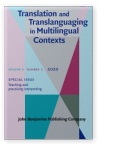The challenge of oratory in the training of consecutive interpreting reflected in a students’ diary
According to EU guidelines, oral expression is one of the key competences students ought to master during their
university training. The Spanish educational system, however, has paid little attention to the development of oratory skills and
most students fear speaking in public. In the case of those who study interpreting, where speaking in public is, obviously, an
essential tool to carry out their task, this lack of training can negatively affect their own learning process. Hence, solving
this issue will be key to better acquire the technical skills needed.
In order to study the abovementioned shortcoming, this paper will present a study carried out at the University of
Salamanca with Consecutive Interpreting undergraduate students. Their experience speaking in public – or lack thereof – has been
analyzed through questionnaires and students’ diaries were used as pedagogical introspection and retrospection tools. The
usefulness of diaries in educational contexts has already been demonstrated as a valuable didactic strategy, as they foster
critical self-analysis and reflection, making students question their vision of the world (
Hiemstra 2001) and helping them manage frustration better.
As trainers, the students’ diaries had a twofold objective: they offered initial data on the pupils’ experiences
and their attitude towards oral presentations, while at the same time allowing teachers to monitor their reactions to the training
actions implemented in the classroom to combat the students’ fear of speaking in public.
Article outline
- 1.Oral expression within the framework of European convergence
- 2.Oral expression in consecutive interpreting
- 3.The student’s diary in the consecutive interpreting classroom: A didactic action
- 4.Conclusions
-
References
